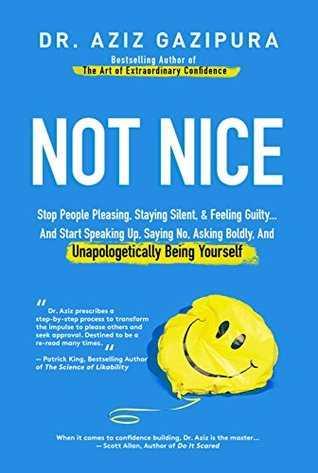Your one stop book summary, audiobook and book review spot for:
Not Nice Summary
About Not Nice Book
Are You Too Nice?If you find it hard to be assertive, directly ask for what you want, or say "no" to others, then you just might be suffering from too much niceness.In this controversial book, world-renowned confidence expert, Dr. Aziz Gazipura, takes an incisive look at the concept of nice. Through his typical style, Dr. Aziz uses engaging stories, humor, and disarming vulnerability to cut through the nice conditioning and liberate the most bold, expressive, authentic version of you. You'll discover how to: => Easily say "no" when you want to and need to.=> Confidently and effectively ask for what you want.=> Speak up more freely in all your relationships.=> Eliminate feelings of guilt, anxiety, and worry about what others will think.
See More
4.3/5 (9871 reviews)
Audio and text
Download free PDF
You are TOO Nice.
- Do you walk an extra mile for people ALL the time?
- Do you blame yourself in difficult situations ?
- Do you end up feeling frustrated in uncomfortable situations ?
- Do you always ask yourself what did I do wrong ?
- Do you end up feeling overwhelmed ?
If you answered a yes to most of the questions, chances are you are being 'too nice'.
Is that a problem, you ask ? Let's break it down for you.
80
Am I being nice or needy ?
Being too nice comes out a few factors :
- Fear of abandonment : Fear that people would leave us
- People pleasing : We are not comfortable with people not liking us
- Neediness : Our need of emotional support and clinginess
- Fear of being alone : We are afraid of ending up alone
Notice that I have used 'we','us' and 'our' in the above terms. As humans,we crave love and emotional bonding, so it is extremely normal to fall into the trap.
78
Why is it a problem to be too nice ?
1. Low self esteem : People pleasing means we depend on others a lot for validation and our choices are driven by their response. This weakens our sense of self.
2. Constant Dissatisfaction : Since our focus is not what we really want or like, we always end up unhappy with our life.
3. Emotional Burnout : We often take extra steps and give way more than we take from others. This emotionally drains us.
All in all, affects our own mental peace.
88
You are not responsible for other people’s feelings.
AZIZ GAZIPURA
15
When we’re trying to be nice, please others, and be a “good person” who everyone likes, we end up becoming way more self- absorbed.
AZIZ GAZIPURA
13
Once we’ve let go of taking responsibility for others’ feelings, it frees us up to focus on them and really give them what we can in the moment.
AZIZ GAZIPURA
12
תפסיק להיות נחמד - כשלא צריך - ותשיג מטרות שאתה רוצה
להיות "לא נחמד" זה אומר להתחיל להיות כנה עם עצמי, כשאני לא יכול - אני לא עוזר, כשמשהו לא מתאים, אני אומר בצורה אסרטיבית, מציב גבול, ולא מצטער על זה, אבל בצורה מנומסת
כתוב 3 דברים שאתה מחליט שאתה פועל לגביהם וצא לעשות אותם, אל תשאיר את זה במחשבה
אחרי שאתה מבצע, אתה כנראה תרגיש קצת רע, זה הכרחי וזה בסדר כי ככה גדלת
אל תפחד בדחייה - במקרה הכי גרוע שתקבל לא, תדע שניסית ולא תשב לחשב "מה היה אם הייתי עושה"
1
Supercharge your mind with one idea per day
Enter your email and spend 1 minute every day to learn something new.
I agree to receive email updates
